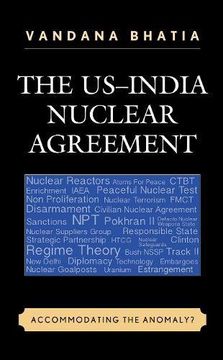Compartir
The Us-India Nuclear Agreement: Accommodating the Anomaly? (en Inglés)
Vandana Bhatia (Autor)
·
Lexington Books
· Tapa Dura
The Us-India Nuclear Agreement: Accommodating the Anomaly? (en Inglés) - Vandana Bhatia
$ 116.84
$ 158.57
Ahorras: $ 41.73
Elige la lista en la que quieres agregar tu producto o crea una nueva lista
✓ Producto agregado correctamente a la lista de deseos.
Ir a Mis ListasSe enviará desde nuestra bodega entre el
Martes 28 de Mayo y el
Miércoles 29 de Mayo.
Lo recibirás en cualquier lugar de Estados Unidos entre 1 y 3 días hábiles luego del envío.
Reseña del libro "The Us-India Nuclear Agreement: Accommodating the Anomaly? (en Inglés)"
The United States-India nuclear cooperation agreement to resume civilian nuclear technology trade with India-a non-signatory of the Nuclear Nonproliferation Treaty (NPT) and a defacto nuclear weapon state-is regarded as an impetuous shift in the US nuclear nonproliferation policy. The 2008 nuclear agreement aroused sharp reactions and unleashed a storm of controversies regarding the reversal of the US nonproliferation policy and its implications for the NPT regime. This book attempts to overcome the significant empirical and theoretical deficits in understanding the rationale for the change in the US nuclear nonproliferation policy toward India. This nuclear deal has been largely related to the US foreign policy objectives, especially establishing India as a regional counter-balance to China. The author examines the US-India nuclear cooperation agreement in a bilateral context, with regard to the nuclear regime. In past discourse India has been mainly viewed as a challenger to the nuclear regime, but this reflects the paucity in understanding India's approach to the issue of nuclear weapons. The author relates the nuclear estrangement to the disjuncture between the US and India's respective approach to nuclear weapons, evident during the negotiations that led to the framing of the NPT. The change in the US approach towards India, the nuclear outlier, has been exclusively linked to the Bush administration, which faced considerable criticism for sidelining the nonproliferation policy. This book instead traces the shifting of nuclear goalposts to the Clinton administration following the Pokhran II nuclear tests conducted by India. Contrary to the widespread perception that the decision to offer the nuclear technology to India was an impromptu decision by the Bush administration, the author contends that it was the result of a diligent process of bilateral dialogue and interaction. This book provides a detailed overview of the rationale and the developments that led to the agreement. Employing the regime theory, the author argues that the US-India nuclear agreement was neither an overturn of the US nuclear nonproliferation policy nor an unravelling of the NPT-centric regime. Rather, it was a strategic move to accommodate India, the anomaly within the regime.
- 0% (0)
- 0% (0)
- 0% (0)
- 0% (0)
- 0% (0)
Todos los libros de nuestro catálogo son Originales.
El libro está escrito en Inglés.
La encuadernación de esta edición es Tapa Dura.
✓ Producto agregado correctamente al carro, Ir a Pagar.

